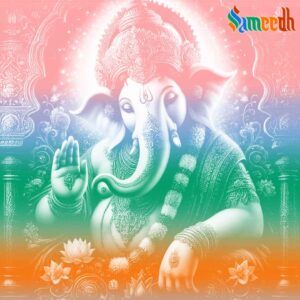The story of why Lord Ganesh has an elephant head and why he is worshipped before any other god is rooted in Hindu mythology and is one of the most popular tales from the Purans. It reflects themes of devotion, wisdom, and the divine order of the universe.

1. Why Lord Ganesh is Elephant Headed?
Lord Ganesh is depicted with an elephant head in Hindu mythology due to a unique and iconic tale. Once, while Goddess Parvati was bathing, she decided to create a son to guard her chamber. She used the turmeric paste from her body and breathed life into it, creating a handsome boy. The boy, named Ganesh, was appointed by Parvati as the guardian of her chamber. She instructed him not to allow anyone to enter while she was bathing.
One day, Lord Shiv returned to Mount Kailash, where Parvati resided. Ganesh, loyal to his mother’s command, blocked Shiv’s entry and prevented him from entering Parvati’s chamber. A misunderstanding ensued, and Shiv, unaware that Ganesh was his son, was angered by the obstruction.
Furious at being disobeyed, Shiv engaged in battle with Ganesh. Despite his bravery and divine strength, Ganesh was no match for Shiv’s immense power. In a moment of rage, Shiv severed Ganesh’s head with his trident (trishul), killing him instantly.
When Parvati saw her son lying lifeless, she was heartbroken and furious. Her grief and anger shook the universe, and she threatened to destroy all of creation. To calm her, Lord Brahma, Lord Vishnu, and other gods pleaded with Lord Shiv to revive Ganesh. Realizing his mistake, Shiv instructed his attendants (ganas) to bring the head of the first living being they found. They returned with the head of an elephant calf. Shiv attached the elephant’s head to Ganesh’s body and brought him back to life. While attaching the head, one of Ganesh’s tusks broke off and till date all the images of his are shown with him having a broken tusk.
2. Why Lord Ganesh Is Worshipped Before Any God?
To honor him (Ganesh) and console Parvati, Shiv declared that Ganesh would be worshipped as the “first among gods” and that no ritual, ceremony, or auspicious event would begin without first invoking Ganesh’s blessings. Lord Shiv blessed Ganesh and declared that he would be worshipped before all other deities. Ganesh’s new form with the elephant head symbolized wisdom, intelligence, and the ability to overcome obstacles.
The elephant head of Ganesh is often seen as a symbol of auspiciousness, intelligence, and discrimination. It also represents the ability to remove obstacles and difficulties, making Lord Ganesh one of the most revered deities in Hinduism.
This tradition of worshipping Ganesh first is linked to his role as the “Vighnaharta” (Remover of Obstacles) and “Pratham Pujya” (First to be Worshipped). The declaration by Shiv that Ganesh would be honored before all other gods is a key reason for this practice.
However, there is another famous story that reinforces this belief.
One day, the gods decided to choose a leader for all the gods and the ganas (Shiv’s divine attendants). The gods proposed a test — whoever could circle the world and return first would be made the leader. While other gods, like Kartikeya (Ganesh’s brother), set off on their vehicles to physically circle the world, Ganesh displayed his wisdom. Instead of physically traveling, he walked in a circle around his parents, Lord Shiv and Goddess Parvati, symbolizing that they represented the entire universe for him. This act of intelligence and devotion impressed the gods, and Ganesh was declared the winner.
From that day forward, Ganesh was declared the “first to be worshipped” (Pratham Pujya) before any god, ceremony, or new venture. His role as Vighnaharta (the one who removes obstacles) means that his blessings are sought before starting any new endeavor, ensuring that no hindrances arise.
Symbolism and Significance
- Elephant Head: The elephant symbolizes wisdom, strength, and patience. It signifies Ganesha’s role as a wise, compassionate, and powerful deity.
- Why He Is Worshipped First: Worshipping Ganesha first signifies the removal of obstacles and the smooth progression of any task. This is why his name is invoked at the start of prayers, new ventures, marriages, and even during the writing of books or documents.
- Moral Lessons: Ganesh’s story teaches us that wisdom and devotion are more powerful than brute strength. It also emphasizes the idea that respect for parents and elders can lead to great rewards.
Thus, Lord Ganesh’s elephant head is a symbol of wisdom, intelligence, and adaptability, while his status as the first deity to be worshipped signifies his divine role in ensuring the success of all endeavors.